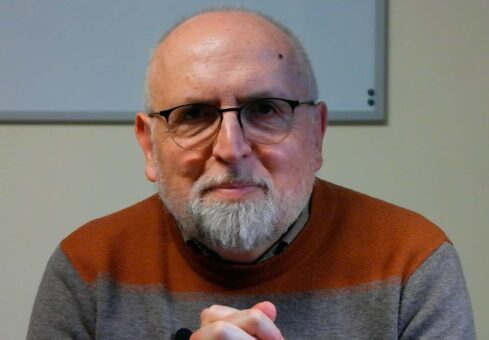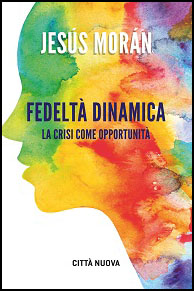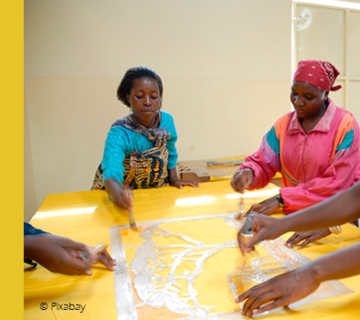An interview with the author on his latest literary work – a book designed to give hope, to keep faith in the charism of unity. Some questions to the co-president of the Focolare Movement on his latest book, published by Citta Nuova, entitled ‘Dynamic Fidelity’.
Jesús, let’s start with the title ‘Dynamic Fidelity’.
I wanted to use the expression that Pope Francis used when he addressed participants at the Focolare Assembly in 2021. There he spoke of dynamic fidelity.
In my opinion it is a very close thought to the concept of creative fidelity, with the advantage that ‘dynamic’ refers to the Greek concept dynamis, which means ‘force of movement’. Therefore, dynamic fidelity is fidelity in motion, which is not static, and this is very dear to Pope Francis.
When he spoke to us on other occasions he emphasised that movements must be precisely ‘movement’. So it seemed to me that this title was closer to the reality that we are living today….
The book is divided into chapters. The first is ‘Taking the pulse of the times’. What perspectives does Chiara Lubich’s charism of unity have for today? How can we update the identity and history of the charism?
 It seems to me that Chiara Lubich’s charism of unity is always topical. Regarding synodality, Pope Francis is insisting that we rediscover how we are the people of God on a journey, where we all play a lead role. Synod means ‘walking together’. He wants a Church where everyone gives their best as an integral part of the people of God, the body of Christ. Here, I think Chiara Lubich’s charism of unity can bring a lot in this sense, with her spirituality of communion, the spirituality of unity.
It seems to me that Chiara Lubich’s charism of unity is always topical. Regarding synodality, Pope Francis is insisting that we rediscover how we are the people of God on a journey, where we all play a lead role. Synod means ‘walking together’. He wants a Church where everyone gives their best as an integral part of the people of God, the body of Christ. Here, I think Chiara Lubich’s charism of unity can bring a lot in this sense, with her spirituality of communion, the spirituality of unity.
On the other hand, today there are so many conflicts, wars, massive polarisation everywhere – in the political, moral, social spheres – and perhaps like never before we are witnessing almost irreconcilable contrasts. I believe that here too the charism of unity can contribute a great deal with the dialogue it weaves.
So today the charism of unity must be modernised, rediscover its true identity, going back to the essentials, to the founding core of the charism. This modernisation requires implementing two moments, not in a chronological sense, but in a profound sense. On the one hand is listening to the signs of the times, the questions of the world, of contemporary society. On the other, going deep, fishing out all those resources that the charism has, some of which have not even been expressed. I really like this concept of expressing the unexpressed that is within us.
This is how identity is updated in a dynamic fidelity. Together with the process of purifying our memory that we are going through in this post-foundational phase, I think we are ready to take this step.
Modernising a charism is achieved with everyone’s contribution and a change of mentality and mindset. Besides invoking the help of the Holy Spirit, what can we do to implement this?
Without a doubt, the help of the Holy Spirit is fundamental because we are in the context of a work of God. But to modernise the charism requires intelligence – not in the academic sense, but more in the sense of wisdom. It takes talent and skill to listen to the cry of humanity.
What is said in the document of the General Assembly of 2021 is important: today the demands of humanity that we must listen to are the cries of Jesus Forsaken. So in addition to the Holy Spirit, we need the intelligence of the charism and the wisdom that comes from life. This is not a desk exercise, an academic exercise. One can grasp the cry of the forsaken Jesus when one is in contact with the suffering of our contemporaries.
What is the ‘theology of the ideal of unity’? Why is it important for fidelity to the charism?
Chiara Lubich herself said that theology would be important for the future of the Focolare Movement and the charism. This means deepening the charism of unity in the light of revelation, from where it sprang, and of theological research. It is an exercise in the intelligence of the charism that is fundamental, otherwise it is not incarnated and above all it is not universalised.
Without a theology of the ideal, the charism remains within the Movement. With a theology of the ideal of unity, the charism can also go outside, as well as finding a solid foundation. The theology of the Ideal of unity helps to understand it well so that it can be passed on to future generations.
Life and witness always go first, but this work is also decisive. The theology of the ideal of unity prevents possible deviations. The original kerygma, encapsulated in the Gospels, needed the arduous work of the Church Fathers, great theologians, to be saved in its integrity.
Doesn’t modernisation risk causing the charism to lose its identity?
Quite the contrary. It is precisely not modernising that makes the charism lose its identity, because the identity of a charism is always dynamic and creative. It is always about being the same without ever being the same.
This is what I have tried to express. Being static makes a charism lose its identity because it makes it lose its connection with reality. For me this is very clear: constant updating is needed for the charism to maintain its identity. And Chiara did this throughout her life.
 The second chapter, ‘The house of self-knowledge’, takes its cue from a letter by Catherine of Siena. Here we discover our limitations, failures, self-consciousness, the face of Jesus Forsaken. What can we do to pass the ‘test of self-knowledge’?
The second chapter, ‘The house of self-knowledge’, takes its cue from a letter by Catherine of Siena. Here we discover our limitations, failures, self-consciousness, the face of Jesus Forsaken. What can we do to pass the ‘test of self-knowledge’?
The second chapter is fundamental in this phase we are living through, in which we have had to come to terms with our faults, our errors in incarnating the charism.
What can we do to pass the test? We must live it to the full, because it is a matter of recognising that we are not up to the charism. None of us are up to the charism.
This does not give rise to a sense of dismay, but rather a new trust in God, in the Holy Spirit, the author of the charism. So the test of self-knowledge is overcome by accepting the humiliation of not being up to it and placing all our trust in God.
The third chapter is ‘Discernment in the light of the charism of unity’. The pope asks us to become artisans of community discernment. How should we proceed? And above all, is Chiara Lubich’s charism of unity a charism in discernment?
For Pope Francis, discernment and synodality go hand in hand, both individual and communal. It is a very delicate process, because it requires intelligence, but above all listening to the Holy Spirit. Discernment asks everything of us and everything of God.
And this is not simple; it is not an exercise in consensus. It is going deep in seeking God’s will at all times. I believe that the typical dynamism of the charism of unity, which we call Jesus in the midst, that is to merit the presence of Jesus among us, is an exercise in discernment.
Chiara Lubich explained it quite well: to merit this presence it takes complete detachment from ourselves, listening to the Holy Spirit. It takes mutual love. Chiara herself developed the idea of trinitarian relationships, which transform community discernment into ‘trinitarian discernment’. When we aim to have Jesus in our midst, we have a trinitarian experience, with all the weaknesses, the frailties of our humanity, physicality, psychology. But we do it, and that is where discernment happens. We can read this practice of trinitarian relationships in the light of Pope Francis’ great idea of discernment and synodality.
In the book you talk about two deviations: ‘the seizure of the One’ and ‘the dissolution of the One’. What are they and how can we avoid them?
These temptations are really two deviations from the spirituality of unity. In the first it happens that someone takes over the mission of the community and even the mission of each person. There is someone who centralises everything, who without realising it takes the place of the Holy Spirit in the dynamic of unity. In this case the ‘we’ is seized, which is necessary for each one to flourish and make their contribution. This is where abuses of authority, abuses of conscience, and spiritual abuses occur, and it is therefore a strong risk.
In the dissolution of the One the opposite happens; the spirit of communion is lost. An exaggerated individualism prevails. If someone takes over the ‘we’ beforehand, it disappears and everyone’s individualism takes over. Community life becomes an organisation where everyone seeks their own space, their own personal fulfilment. Here too the Holy Spirit, who is the dynamism of Christian life, disappears.
How to avoid these? We need a moment of self-awareness: understand the mistakes made. At the same time, we need to return to living the Gospel and an authentic life of unity. Above all, I think with humility, the ability to decentralise, love for each other, and continually thinking that the person is an absolute that cannot be annulled in any way. So I think the solution is more love, truth, transparency and concrete giving of ourselves in the life of unity, the life of communion.
Unity is a gift of the spirit – no one can seize it with their power or dissolve it with their individualism. Unity is an experience of God that takes all of us. Let us realise this.
Finally, what can we do to ensure that all these topics in the book do not remain the best of intentions?
I think it would be useful to talk about it in the community, have moments when we read certain passages, retreats, and examine our lives in the light of these suggestions.
The book is meant to give hope, to keep faith intact in the charism of unity, and if it has been lost, to recover it. I hope that by sharing experiences we can restore authentic life there where it no longer exists, because in so many places life flourishes, it generates, and there are so many beautiful things.
Lorenzo Russo


 Italiano
Italiano Español
Español Français
Français Português
Português




Merci beaucoup pour les brèves explications des différents chapitres. Je retiens : Sans la théologie de l’idéal, le charisme reste à l’intérieur du Mouvement. Avec une théologie de l’idéal d’unité, le charisme peut aussi aller à l’extérieur.
La vie et le témoignage passent toujours en premier. Avoir : discernement et écoute de l’Esprit Saint.
Comprendre les erreurs commises. Revenir à l’Evangile vécu et une authentique vie d’Unité.
L’Unité est une expérience de Dieu qui nous prend Tous. Prenons en conscience. 1 Andrée
J’ai beaucoup apprécié que tu soulignes que le charisme permet d’exprimer en particulier des aspects qui n’ont encore jamais été exprimés en même temps que la place laissée à l’Esprit Saint est fondamentale. Ce qui donne la possibilité à chacun d’aller “pêcher” (comme tu le dis) au fond de soi l’unique, l’inexprimé, voire l’inexprimable auquel l’Esprit Saint peut donner parole et ainsi enrichir la communion.
Dove posso trovare un video di Jesus che presenta questo libro???
al momento non c’è un video di presentazione. Jesus Moran ne ha parlato in vari eventi ma non sono presenti video mi dispiace.
Grazie, per questa intervista che ha generato delle belle risposte in Jesus. In particolare mi ha colpito questo passaggio: “…L’unità è un dono dello Spirito, nessuno può sequestrarla col suo potere né dissolverla col suo individualismo. L’unità è una esperienza di Dio che prende tutti noi stessi”. Se riuscissimo tutti profondamente a comprendere questo concetto…sarebbe una delle cose più essenziali per “stare” con “fedeltà dinamica” dentro l’Opera di Maria.
Gracias por publicar la entrevista. Gracias Jesús por tu escucha al Espíritu Santo para escribir y comunicarnos siempre cosas nuevas que me hacen reflexionar y tratar de vivir con mayor radicalidad el Carisma de la Unidad.
That’s really great.
We need this knowledge Jesus.
Gracias Jesús por tu nuevo libro, por tus respuesta de constante búsqueda y abriendo pistas en el horizonte de la unidad… Este libro estará escrito o traducido en castellano?
No, no por el momento. Ya veremos en el futuro.
Super interview. I love what Jesus is saying